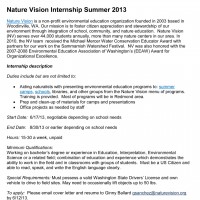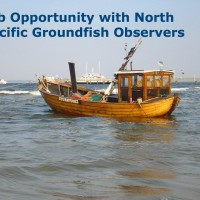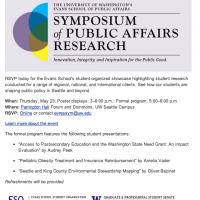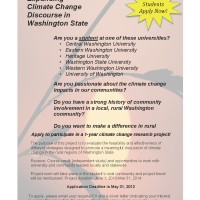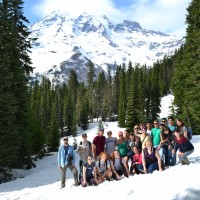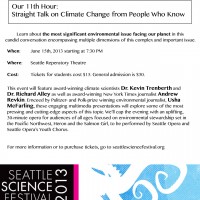Position Title: North Pacific Groundfish Observers
Agency/Location: AIS, Inc. (contractor no NMFS). Positions located in ports along the Gulf of Alaska and the Bering Sea.
Responsibilities: Work at sea collecting and recording fish catch/discard and biological samples for the National Marine Fisheries Service (NMFS) aboard commercial fishing vessels. Observers record detailed information on the gear and fishing activity of the vessels. Vessels range from 40 ft to 125 ft and trips are 2 to 10 days. After attending 1 to 4 week paid training course observers are deployed from ports throughout the Bering Sea and the Gulf of Alaska.
Qualifications: A BS in Marine Biology or other natural science is require including 30 semester hours of biological course work including at least one course that required extensive use of dichotomous keys and 5 semester hours of mathematics consisting of at least one math course and one statistic course. Previous observer experience, sea and fish research experience strongly preferred A valid driver’s license and US passport are required.
Compensation: Starting rate atre $15.00 per hour plus health/dental insurance/vision, vacation. sick and holiday benefits. Experienced observers may be paid at higher rates depending on qualifications and experience. Overtime is paid for hours worked in excess of 8 hours in a day or 40 hours in a week.
Closing: Open until filled
Contact: If you would like to apply, please click the following link http://goo.gl/CR1fG to submit the required information: resume, cover letter, at least 3 professional references (name, email, and phone number), latest NPGOP evaluation (is applicable , and unofficial copies of your college transcripts.
For more information please visit the AIS, Inc. website www.aisobservers.com
Unique and Exciting Opportunity to Serve as Peer Instructor with Program on the Environment and UW International Educational Outreach
Only a few more positions remain available to upper-level undergraduate students from diverse program to assist as Peer Instructors with students from Japan (Keio University) from August 1st-21st. The course, “Humans and the Environment in the Pacific Northwest,” will expose the visiting students to topics ranging from forest ecology and water to green building and urban food sustainability. Peer Instructors will assist in leading activities (including field trips to places like Mt. Rainier, the Cascade Mountains, and the Bullitt Center and activities like hiking and canoeing) as well as in mentoring students on topic-based research projects. Students need to be available at least part-time and preferably full-time during the course period.
Benefits include:
· Fun field trips and learning.
· Potential T.A. course credit or capstone credits.
· Enhancement of resume-building skills including teaching, facilitating, and project management.
· Practice communicating with international students and development of friendships with Japanese youth.
· Training and mentoring from course instructor.
Comment from previous Peer Instructor:
“Not only do I now have the capability of teaching a class of non-native English speaking students, but I have an increased competence in working with a large teaching team and coordinating events amongst multiple parties to ensure the efficacy of lesson plans and safety of field trips. The Keio program gave me a taste of what I want to do and what I will always incorporate into my life…I am so proud to have been part of something so wonderful.”
Positions will be filled on a rolling basis in spring quarter 2012. Some experience in environmental studies and/or Japanese studies is preferred, but not required.
Please email course Instructor Megan Horst ASAP at horstm@uw.edu to be considered.
** A get-to-know you session for TAs will happen soon! Keep your eyes posted for more info!
[course][aut/2013]: ENVIR 495D: Culture & Conservation: Protected Areas Management in Global Perspective
Dear All,
A number of social theorists have critiqued global conservation as a problematic form of eco-colonialism. We will discuss this and other critiques of conservation to help us understand why even “community-based” initiatives sometimes generate conflict and yield underwhelming results. However, we will also mine the literature for suggestions about how to move beyond these critiques. How can we take part in the design of more socially just and ecologically sustainable approaches to protected areas management?

Peace Corps Information Session
For all of you that are interested in the Peace Corps, an information session will be held on campus tomorrow! It is a good chance to learn more about the program and have any questions answered that you may have.
When: May 16th from 4:00-5:30pm
Where: Parrington Hall 108
Save the Date! Student presentations on ‘Green Investing and the UW’
When: Thursday, June 6th, 2013
12:30pm-1:30pm (Presentation and Q&A),
1:30pm-2:00pm (Light Refreshments and Social)
Where: PoE/Wallace Hall Commons
Who: Presentations by the ENVIR 480 Sustainability Studio students
What: This quarter, students explored challenging questions related to sustainability and investing, and incorporating discussions of values and action: Should the UW’s endowment be a tool for pursuing environmental goals? Should the UW be investing in fossil fuel companies?
These are important questions – and yet we found, via surveys, that very few students know much about UW’s investments or green investing. Come hear ENVIR 480 students share what they have learned and also evaluate the challenges and opportunities of various green investing strategies for UW including:
- Divestment from fossil fuel companies
- Shareholder activism
- Disclosure requests
- Green revolving loan funds, and
- Campus-wide education
Questions? Contact instructor Megan Horst at horstm@uw.edu
For more information on ENVIR 480, see the class blog at http://envir480.tumblr.com/ and the course website, including past reports, at http://depts.washington.edu/poeweb/undergraduate_programs/courses/sustainability-studio.php
Check out a field trip to Mt. Rainier that the ENVIR 280 class went on this past weekend! The group traveled from the mouth of the Nisqually River (where they were birdwatching) to the source, where they learned about subalpine ecology and glaciers.
The ENVIR 280 course taught by Tim Billo is titled Natural History of Puget Sound Region, and is offered only in the spring. Keep your eyes out for it next year!
